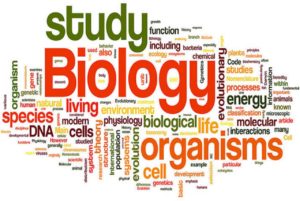120 Biology Quiz Questions Answers – Learn about Biology

Biology Quiz Questions Nature and Scope of Biology – Biology Questions 1- 30
Stanford Department of Biology
1) What is ecosystem?
Answer: The entire living community and non-living factors of the environment together from the ecosystem.
2) Which form of science dealing with the study of structural and cultural traits of human beings?
Answer: Anthropology.
3) What are the two functional groups in an ecosystem?
Answer: Autotrophs and heterotrophs.
4) Where does the primary photo chemical reaction occur in chloroplast?
Answer: Quantasome.
5) What is exobiology?
Answer: It is the study of life in outer space.
6) What is the magnification of an electron microscope?
Answer: 100000
7) Which is the monocarpic plant which shows gregarious flowering once in 48 years?
Answer: Bamboo.
8) Write an example of serendipity.
Answer: Discovery of penicillin by Fleming.
9) What do you mean by Hydroponics?
Answer: Plant growth in liquid culture medium.
10) What is the technique of separation of disrupted cell components?
Answer: Fractionation.
11) What is EM?
Answer: Electron microscope.
12) Name two monocarpic plants which show gregarious flowering.
Answer: Bambusa tulda, Melocanna bambusoides.
13) Under what system, organisms are provided with scientific means?
Answer: Binomial nomenclature.
14) What is the name of that branch of Biology which devoted to identifying, naming and classifying organisms?
Answer: Taxonomy.
15) Who was the author of ‘Man’s place in nature’?
Answer: Huxley.
16) Both living and the non-living are made of same elements and are governed by the similar physical laws. In which respect are they different?
Answer: Level organization.
17) Expand the TMV.
Answer: Tobacco Mosaic Virus.
18) What is DNA?
Answer: Deoxyribonucleic acid.
19) What is Histology?
Answer: Histology is the study of tissues (Microscopic anatomy)
20) Which is the free living soil bacteria in fixes nitrogen?
Anatomy: Azotobacter.
21) What is Physiology?
Answer: Physiology is the study of structure and functions.
22) What is Cell Biology?
Answer: Cell Biology is the study of structure and reproduction of cells.
23) What do you mean by Genetics?
Answer: Genetics is the study of heredity and variations.
24) Write a Radio isotope.
Answer: I-131
25) How does the living and non-living resemble up to the level organization?
Answer: Molecules and compounds.
26) What number of chemicals are present in a cell?
Answer: About 5000.
27) Write an example of homeostasis.
Answer: Increased heart beat on running and sweating during exercise.
28) Which is called blue-print of information?
Answer: DNA.
29) Which cells are programmed to die during embryonic stage?
Answer: Vessel elements.
30) Why virus cannot be cultured in totally artificial medium?
Answer: Because it lacks machinery to use genetic information.
Learn about Biology – Quiz Questions Plant Kingdom – Biology Questions 31-60
31) What are seedless plants called?
Answer: Cryptogams.
32) What is Dendrology?
Answer: The study of trees called Dendrology.
33) Energy is converted from sunlight and released by what?
Answer: Respiration.
34) Name the process by which plants prepare their food.
Answer: Photosynthesis.
35) What is Tonoplast?
Answer: Tonoplast is the membrane around the plant vacuoles.
36) What is the other name of root cap?
Answer: Calyptra.
37) What is Anemophily?
Answer: It is the pollination by wind.
38) What is pollination?
Answer: The transference of pollen grain from the another of a flower to the stigma is known as pollination.
39) What is Clinostat?
Answer: Clinostat is an apparatus used to demonstrate photoperiodism.
40) Name the process by which terrestrial plant loses water?
Answer: Transpiration.
41) What is the term used for the occurrence of more than one type of morphologically different leaves on the same plant?
Answer: Heterophylly.
42) In which country the hormone gibberellin was discovered?
Answer: Japan.
43) Name the natural process involving loss of water from a plant in the form of liquid drops.
Answer: Guttation.
44) What is the technical name of the natural opening in the leaves meant for gaseous exchange?
Answer: Stomata.
45) What are Heliophytes and Sciophytes?
Answer: Heliophytes are plants that grow in full sunlight, Sciophytes are plants that grow in shade.
46) Name the four insectivorous plants.
Answer: 1. Drosera, 2. Dionaea, 3. Aldrovanda, 4. Utricularia.
47) What is the color of Carotene?
Answer: yellow.
48) What is the source of chemical energy during photosynthesis?
Answer: Adenosine Triphosphate (ATP)
49) What is the shape of chloroplast in spirogyra?
Answer: Ribbon shaped.
50) Which plant has the lifespan of 4000 years?
Answer: Gnetum.
51) Name the organelle where photosynthesis takes place?
Answer: Chloroplast.
52) What are the three kinds of plastids?
Answer: 1. Leucoplasts, 2. Chloroplasts, 3. Chromoplasts.
53) What is the other name for Nastic movement?
Answer: Sleep movement.
54) What is cladode?
Answer: The modification of stem to carry the function of leaf is called cladode. Example: Opuntia.
55) What is the male reproductive part of the flower known as?
Answer: Stamens.
56) Name the instrument used to demonstrate geotropism?
Answer: Clinostat.
57) What are the types of flagella noticed in Algae?
Answer: Whiplash, Tinsel.
58) What are Atrichous bacteria?
Answer: Bacteria which do not have flagella are called Atrichous bacteria.
59) What are the other names for dark reaction of photosynthesis?
Answer: Blackman’s reaction or Calvin cycle.
60) What is the most common nutritive tissue for the developing embryos in angiosperm known as?
Answer: Endosperm.
Biology Quiz Questions Animal Kingdom – Biology Questions 61-90
61) What is an animal?
Answer: The word animal comes from Latin, meaning breath or soul. It includes mammals, birds, reptiles, fish, frogs, clams, lobsters, insects, worms, and jelly-fish.
62) What are invertebrates?
Answer: They are a division of the animals which have no vertebral column.
63) Which is the biggest cell?
Answer: The egg of the bird ostrich.
64) Gave the names of three fur bearing animals?
Answer: The sable, a kind of antelope, mink and the arctic fox are fur bearing animals.
65) Which living animal has the longest lifespan?
Answer: Tortoise.
66) What is a flying fox?
Answer: It is a kind of bat.
67) Which is the largest marsupial?
Answer: Red kangaroo.
68) How do mammals communicate?
Answer: They communicate by sounds, touch, visual clues, and odor.
69) What is a viviparous?
Answer: A viviparous animal is one that gives birth to young ones.
70) What is Murrah?
Answer: It is a hybrid buffalo which is a high milk producer.
71) Which is the tallest living animal?
Answer: Giraffe.
72) Which is the biggest land animal?
Answer: African bush elephant.
73) How many species are there in mammals?
Answer: There are forty thousand species.
74) What is Pangolin?
Answer: It is a mammal which does not have teeth.
75) Which is the animal that never drinks water?
Answer: Kangaroo rat.
76) What is Herbivorous?
Answer: Herbivorous is the term used to describe plant eating animals.
77) Which are the mammals that lay eggs?
Answer: Spiny anteaters and the duck-billed platypus.
78) How far can a kangaroo jump?
Answer: It can cover a distance of 7 to 9 meters just in one jump.
79) Where is the metameric segmentation occur?
Answer: Annelida.
80) Why do animals have hair?
Answer: They help to retain the internally producing heat.
81) Which the animal that has a tongue longer than its body?
Answer: Chameleon.
82) Which animal has the biggest brain?
Answer: Sperm Whale.
83) What kind of animals lives underground?
Answer: Bees, badgers, earth worms, turtles and toads.
84) Which are the cats that have no tail?
Answer: The Manx and the Siamese.
85) Which animal is the fastest on foot?
Answer: Cheetah.
86) Why does the egg happen to be larger in size when compared to the other cells?
Answer: Because the food for the growth of the embryo is stored in egg.
87) Which is the aquatic animal with the most developed intelligence?
Answer: Dolphin.
88) What is the average length of dolphin?
Answer: 1.3 meter.
89) Name four animals which are put to work by man?
Answer: The donkey, the mule, the camel, the bullocks.
90) What is called an animal which eats human flesh?
Answer: Feline.
Biology Quiz Questions Inventions in Biology – Biology Questions 91-120
91) Who discovered penicillin?
Answer: Alexander Fleming.
92) Who discovered the vaccine for small pox?
Answer: Edward Jenner.
93) Won invented the stethoscope?
Answer: Dr. Rene Laennec.
94) Who discovered the bacterium which causes anthrax?
Answer: Robert Koch.
95) Who invented Golgi bodies?
Answer: Camillo Golgi.
96) Who first discovered cells?
Answer: Robert Hooke.
97) Who discovered the nucleic acid?
Answer? Miescher.
98) Who is called the father of modern biology?
Answer: Aristotle.
99) Who discovered insulin?
Answer: Sir Fredrick Grant Banting and J.J.R. Macleod.
100) Who was the inventor of cortisone?
Answer: Edward Calvin Kendall.
101) Who wrote the book origin of species?
Answer: Charles Darwin.
102) Who proposed the term Species?
Answer: John Ray in 17th century.
103) Who proposed Germplasm theory?
Answer: August Weismann.
104) Who proposed biogenetic law?
Answer: Haeckel.
105) Who published the book Descent of the man?
Answer: Charles Darwin.
106) Who proposed the theory of Biogenesis?
Answer: Louis Pasteur.
107) Who coined the term Ecology?
Answer: German scientist Ernst Haeckel.
108) Who coined the word Ecosystems?
Answer: A.G Tansley in 1935.
109) Who coined the term Diapause?
Answer: Wheeler in 1893.
110) Who introduced the term Physiology?
Answer: Jean Fernel in 1552.
111) Who coined the term Vitamin?
Answer: Funk in 1912.
112) Who discovered O type of blood group?
Answer: Landsteiner.
113) Who founded the science of anatomy?
Answer: Galen.
114) Who is the first person to study the dissected human body?
Answer: Vesalius.
115) Name the scientist who proposed the theory of mutation.
Answer: Hugo de Vries.
116) Who discovered Endocrinology?
Answer: Bay Liss and Starling.
117) Who proposed the recapitulation theory?
Answer: Von Bear.
118) Who invented neurology?
Answer: Franz Joseph Gall.
119) Who discovered Radium?
Answer: Marie Curie.
120) What is the discovery of Louis Pasteur?
Answer: Vaccination of hydrophobia and the germ theory of disease.
Read : 120 Chemistry Quiz Questions Answers – Learn about Chemistry



It was very much useful. Thnx